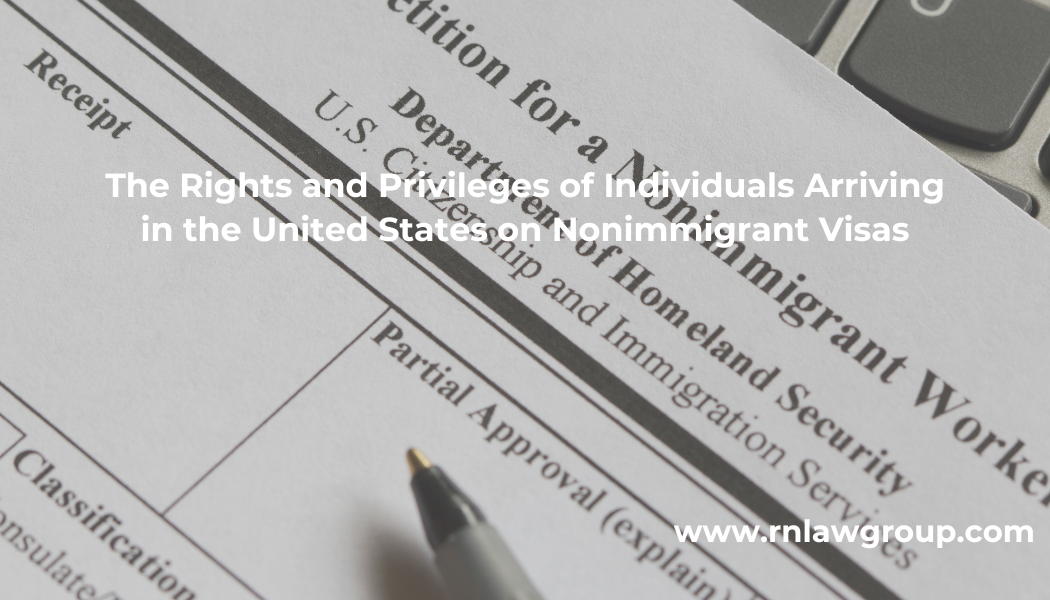
The Rights and Privileges of Individuals Arriving in the United States on Nonimmigrant Visas
Every year, millions of individuals enter the United States on nonimmigrant visas for a variety of reasons, such as tourism, business, education, temporary employment, or cultural exchange. Holders of these nonimmigrant visas significantly contribute to the enrichment of American society, bolster the economy, promote research and innovation, and enhance international relationships. Although their stay in the United States is restricted by the terms and duration of their specific visa categories, they are still granted a comprehensive array of rights and privileges under U.S. law. Recognizing these rights not only aids in safeguarding individuals from mistreatment and exploitation but also guarantees adherence to immigration laws and nurtures a respectful relationship between visitors and host communities.
I. Overview of Nonimmigrant Visas
Nonimmigrant visas are granted to foreign nationals who plan to enter the United States temporarily for a designated purpose. In contrast to immigrant visas, which are meant for those seeking permanent residency, nonimmigrant visas come with specified durations and conditions. There are over 20 categories of nonimmigrant visas, including B-1/B-2 for business and tourism, F-1 for academic studies, J-1 for exchange visitors, H-1B for specialized workers, L-1 for intracompany transferees, O-1 for individuals with extraordinary abilities, among others.
Each type of visa is regulated by specific laws under the Immigration and Nationality Act (INA) and is overseen by U.S. Customs and Border Protection (CBP), U.S. Citizenship and Immigration Services (USCIS), and the Department of State (DOS). Holders of nonimmigrant visas are required to adhere to the conditions of their visa, which include restrictions on employment, length of stay, and the range of allowed activities. Nevertheless, despite these stipulations, nonimmigrants enjoy a broad spectrum of legal protections and civil rights.
II. Constitutional Protections
One of the most significant and frequently misinterpreted elements of the rights afforded to nonimmigrants is that numerous constitutional protections extend to all individuals within U.S. territory, irrespective of their citizenship or immigration status. The U.S. Supreme Court has consistently upheld that the Constitution safeguards “persons,” not merely “citizens.” This encompasses individuals holding nonimmigrant visas.
Nonimmigrants are entitled to the protections of the First Amendment, which ensures freedom of speech, religion, and assembly. They are also guaranteed due process under the Fifth and Fourteenth Amendments, meaning they cannot be deprived of life, liberty, or property without appropriate legal procedures. This provision guarantees that nonimmigrants have the right to a hearing prior to deportation and that any governmental action impacting their status must be grounded in law and substantiated by evidence. Additionally, the Fourth Amendment shields nonimmigrants from unlawful searches and seizures, while the Sixth Amendment affirms the right to legal representation in criminal cases.
These constitutional protections constitute the foundation of civil liberties in the United States and guarantee that individuals on nonimmigrant visas are not subjected to arbitrary or unjust treatment. While these rights are not without limitations—for instance, visa holders may face deportation for breaches of their visa conditions—they still benefit from a significant level of protection under American law.
III. Labor Rights and Workplace Protections
Many nonimmigrant visa holders, such as those on H-1B, L-1, O-1, or TN visas, are employed in the United States. These workers are entitled to the same basic labor protections as U.S. citizens and permanent residents. Under the Fair Labor Standards Act (FLSA), nonimmigrants must be paid at least the federal minimum wage and are entitled to overtime pay for hours worked beyond 40 per week, unless they are classified as exempt.
Importantly, visa-specific laws such as the H-1B program require employers to pay prevailing wages to foreign workers and ensure that employment conditions do not adversely affect U.S. workers. The Department of Labor (DOL) enforces these provisions and investigates complaints of wage theft, discrimination, or exploitation.
Nonimmigrants also have the right to a safe workplace under the Occupational Safety and Health Act (OSHA), and they are protected against employment discrimination under Title VII of the Civil Rights Act of 1964. Moreover, workers—regardless of immigration status—may report labor violations to agencies such as the Equal Employment Opportunity Commission (EEOC) or file lawsuits to protect their rights. Retaliation by employers for such complaints is illegal.
IV. Access to Education and Healthcare
Nonimmigrant visa holders and their dependents are permitted to access a range of public and private educational institutions. For example, the children of nonimmigrant workers and students can attend public K-12 schools without any fees. Holders of F-1 and J-1 visas generally enroll in universities and colleges, many of which offer supplementary support services such as English language programs, international student advisors, and legal assistance.
Access to healthcare is, however, more intricate and often hinges on the type of visa, the individual’s income, and the presence of employer-sponsored or private insurance. Typically, nonimmigrants do not qualify for federal health programs like Medicaid or Medicare, but they have the option to purchase health insurance through private marketplaces. Certain universities and employers mandate that visa holders enroll in designated health insurance plans. The Affordable Care Act (ACA) is applicable to lawfully present nonimmigrants, which means they are subject to the individual mandate (although the penalty is currently set at zero) and are eligible to buy insurance from the marketplace.
V. Right to Legal Counsel and Redress
Nonimmigrants possess the right to legal counsel in both civil and criminal cases, although this is not necessarily at the expense of the government. This right is particularly vital in immigration proceedings, which are classified as civil matters. While individuals facing removal (deportation) are not entitled to a free attorney, they do have the right to hire one and must be made aware of this right. Numerous legal aid organizations and bar associations provide pro bono or low-cost representation to assist visa holders in navigating the intricate immigration regulations.
Furthermore, nonimmigrants can pursue redress through civil lawsuits or administrative complaints if their rights are infringed upon. For instance, they may lodge discrimination complaints, report wage theft, or contest unlawful visa denials or revocations. The Administrative Procedure Act (APA) and judicial review processes offer a structure for challenging actions taken by federal agencies.
VI. Rights of Dependents
Many nonimmigrant visa categories allow accompanying spouses and children (under the age of 21) to enter the U.S. under dependent visa classifications (e.g., H-4 for H-1B, L-2 for L-1, F-2 for F-1). Although the rights of dependents differ, some may be permitted to work or study based on the specific visa. For instance, H-4 visa holders with approved I-140 petitions can apply for employment authorization. L-2 spouses qualify for automatic work authorization, while F-2 dependents are prohibited from working but may engage in part-time studies.
Dependent children are generally allowed to attend school and participate in recreational and cultural activities. These dependents are also safeguarded by labor laws, public education rights, and constitutional protections, and they may qualify for certain state-level services or scholarships, particularly if they have lived in the U.S. for a significant duration.
VII. Travel and Reentry Rights
Nonimmigrant visa holders possess the right to travel within the United States and, with appropriate documentation, may travel internationally and seek reentry. However, international travel entails certain risks, especially if there are changes in visa status or delays in visa stamping at U.S. consulates abroad. A valid visa and an unexpired passport are typically required for reentry, and individuals must demonstrate that they are maintaining lawful status.
Certain visa categories offer greater flexibility regarding travel and reentry than others. For example, individuals in J-1 exchange programs may be subject to a two-year home residency requirement, which restricts their ability to change status or reenter the U.S. under specific visa categories unless a waiver is obtained. Conversely, B-1/B-2 visitors may encounter increased scrutiny if frequent travel raises suspicions about their intent to reside in the U.S.
VIII. Restrictions and Limitations
In spite of the numerous rights and protections granted to nonimmigrants, there exist considerable limitations. Holders of nonimmigrant visas are required to consistently maintain valid status and adhere to the stipulations of their visas. Infractions such as unauthorized employment, exceeding the allowed duration of stay, or partaking in prohibited activities may result in visa cancellation, initiation of removal proceedings, or future restrictions on reentry.
Furthermore, nonimmigrants might encounter limitations regarding access to specific public benefits. The Personal Responsibility and Work Opportunity Reconciliation Act (PRWORA) restricts eligibility for federal means-tested programs, including food stamps and housing assistance. While access to emergency services, school meal programs, and certain state initiatives may be permitted, visa holders should proceed with caution when applying for public benefits that could raise public charge issues if they intend to adjust their status in the future.
Additionally, visa holders are not entitled to participate in U.S. elections or to run for public office. Any involvement in such activities is considered unlawful and may result in severe immigration repercussions. Moreover, specific visa categories disallow dual intent (the concurrent intention to remain temporarily while seeking permanent residency), which can complicate efforts to adjust status without breaching visa regulations.
IX. Role of U.S. Government and Oversight
The Department of State, the Department of Homeland Security, and the Department of Labor each play vital roles in supervising the rights and obligations of nonimmigrants. These agencies are tasked with the issuance of visas, the regulation of entry and residency, the assurance of labor compliance, and the enforcement of immigration laws. Furthermore, independent oversight entities such as the Office of Inspector General (OIG) and various civil society organizations are responsible for monitoring instances of abuse, discrimination, and breaches of legal standards.
Nonimmigrants who face mistreatment from employers, landlords, or law enforcement have the option to report such occurrences to multiple oversight organizations, including the Civil Rights Division of the Department of Justice or the Office for Civil Rights at the Department of Education. U.S. legislation also provides whistleblower protections in specific situations, particularly those involving fraud or abuse related to visa programs.
X. Conclusion
Nonimmigrant visa holders constitute a diverse, dynamic, and crucial segment of the U.S. landscape. Although they arrive in the country for limited periods and defined purposes, they are safeguarded by a comprehensive framework of legal rights and civil liberties. These rights embody the United States’ dedication to human dignity, the rule of law, and constitutional protections for all individuals within its borders. Nevertheless, the system also entails responsibilities and restrictions that must be diligently adhered to. By comprehending their rights and adhering to immigration regulations, nonimmigrant visa holders can protect their status, make meaningful contributions to American society, and foster enduring connections between nations.
For individuals entering the United States on a nonimmigrant visa, it is essential to be well-informed, take proactive measures to safeguard one’s legal rights, and recognize the resources that can provide assistance during challenging times. Legal advisors, governmental resources, and community organizations present invaluable support in managing the intricacies of living in the U.S. as a nonimmigrant. Ultimately, being aware of one’s rights serves as the most effective protection against exploitation and the most reliable route to a secure, productive, and rewarding experience in the United States
By: Karim Jivani
Karim Jivani is an Associate Attorney at Reddy Neumann Brown PC who focuses on employment-based non-immigrant visas. Karim’s practice covers all phases of the EB-1A and EB-2 NIW visa process including filing petitions, responding to Requests for Evidence (RFE), and drafting motions and appeals. Karim has also worked on all aspects of H-1B, L-1, I-140, and VAWA petitions.

